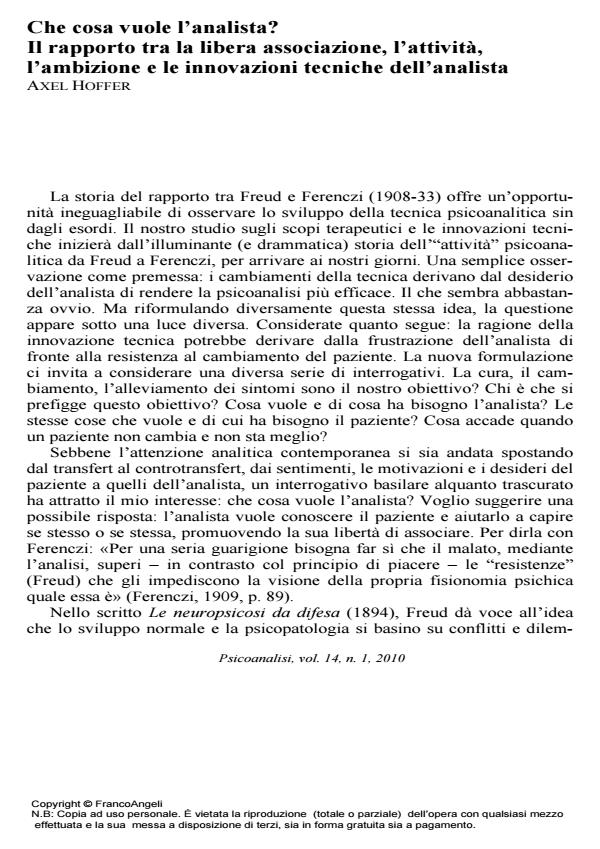Che cosa vuole l’analista? Il rapporto tra la libera associazione, l’attività, l’ambizione e le innovazioni tecniche dell’analista
Journal title PSICOANALISI
Author/s Axel Hoffer
Publishing Year 2010 Issue 2010/1 Language Italian
Pages 25 P. 25-49 File size 834 KB
DOI 10.3280/PSI2010-001002
DOI is like a bar code for intellectual property: to have more infomation
click here
Below, you can see the article first page
If you want to buy this article in PDF format, you can do it, following the instructions to buy download credits

FrancoAngeli is member of Publishers International Linking Association, Inc (PILA), a not-for-profit association which run the CrossRef service enabling links to and from online scholarly content.
The author traces the history of free association, the "fundamental rule", through the Freud-Ferenczi relationship and controversy. The use of "activity", first proposed by Freud in 1910 with phobic and compulsive patients, was then championed by Ferenczi in the early twenties. The goal of activity was to enhance, or, more accurately, "to force" the associations into the analysis. Subsequently, Ferenczi reversed himself, concluding that his analysis was recreating the traumatic parental environment which originally caused the patient’s neurosis. The far-reaching results of Ferenczi’s change of heart included a redefinition of countertransference and added the techniques of "indulgence" and "relaxation" to soften Freud’s emphasis on "abstinence" and "frustration". A vignette from the analysis of a dangerously self-destructive bulimic patient illustrates the value of free association in helping a patient feel understood without pressure to give up her symptoms. Constantly monitoring his therapeutic ambition, the analyst demonstrates the value of free association in enhancing the patient’s understanding of herself and of the survival value of her symptoms. This vignette highlights the fact that the analyst’s therapeutic ambition makes freedom to associate even more difficult for the patient and inevitably intrudes on the analyst’s evenly-hovering attention. Of course for the analyst to have a therapeutic wish is necessary and desirable but for the analyst to demand change promotes compliance and hidden rebellion which limits the analysis.
Keywords: Free association, activity, therapeutic ambition, Freud-Ferenczi controversy, mutual analysis
Axel Hoffer, Che cosa vuole l’analista? Il rapporto tra la libera associazione, l’attività, l’ambizione e le innovazioni tecniche dell’analista in "PSICOANALISI" 1/2010, pp 25-49, DOI: 10.3280/PSI2010-001002